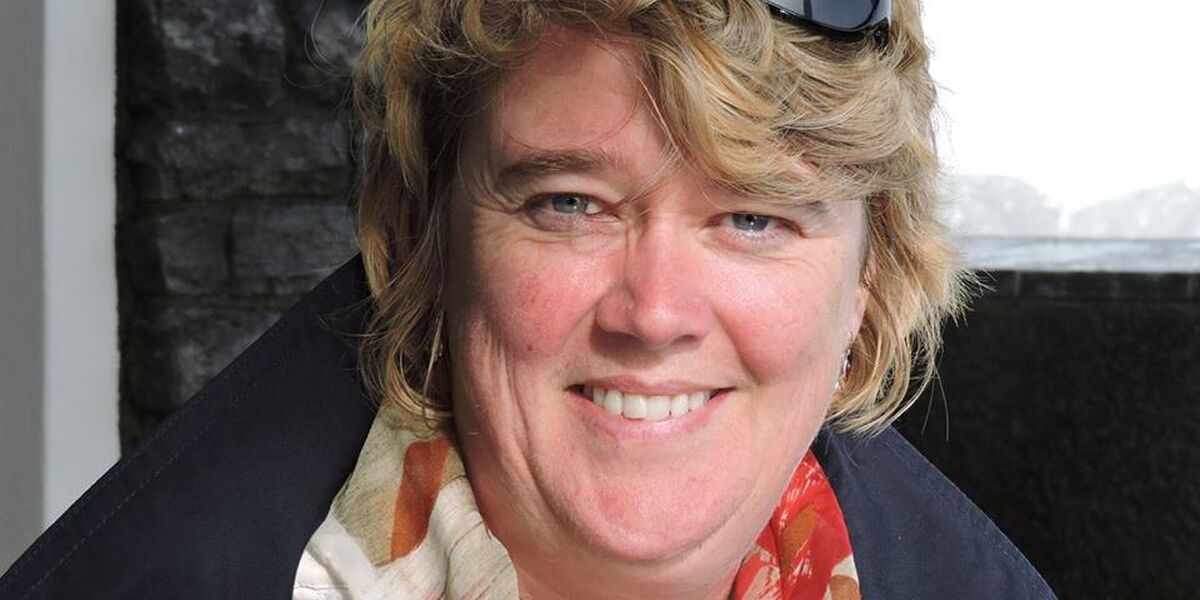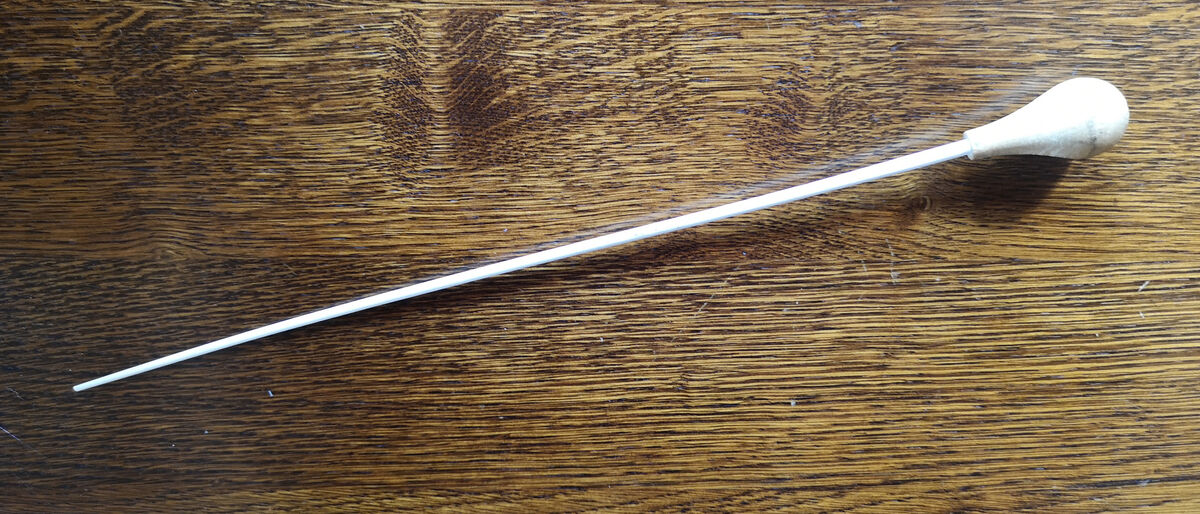

Helen Thomas: Women Conductors in Liverpool
15 Apr 2019
Discovering conducting mid-career transformed Helen Thomas' approach to making music. In this week's blog, she writes about how conducting opened doors for her, her new ensemble partnership, and her work for women in music.
As often seems to be the case with new conductors, I began conducting after being asked to take the odd sectional, to deputise at a rehearsal for an absent conductor. A few years ago I conducted for the first time in a public concert, which was an exhilarating experience. I’ve spent much of my career in academia and my Ph.D. focused on metaphors of musical time and musical analysis. But I’ve become frustrated with the distance between words and music and disenchanted with the insularity of the world of research. Then, a couple of years ago, a very good friend and wonderful musician, Richard Howell Evans, bequeathed me his baton before he died. I felt that I owed it to him to see what it was capable of in my hands.

In Autumn 2017, I was accepted on the RPS Women Conductors Phase 1.5 Workshop. A few weeks before the workshop, my husband David and I booked a short break in Cumbria. Whilst he was off fishing, I studied the scores I’d been sent and shyly practised conducting in front of the bedroom mirror. He flailed around in water and I in air with our chosen ‘magic wands’. It wasn’t difficult to see the funny side when he failed to catch a fish and I failed to illicit any sounds from my imaginary orchestra!
The RPS workshop was the first time I had conducted professional players and I was astonished at the immediacy of their response to my (more or less clear) gestures. I had a ‘light-bulb’ moment when Alice set a task in which we had to introduce extreme changes of mood every four bars in one of the pieces. The results were hilarious but revelatory, and planted a seed of confidence in my ability to express the music. I left that day knowing that I wanted to conduct more; I wanted to experience that sense of sculpting time. Conducting offered an alternative, creative way to employ my analytical skills and explore my fascination with linguistic and visual metaphors.
So the next step was to contact conducting friends (all male) to let them know that I was looking for more conducting experience. These friends have been overwhelmingly supportive, though I was staggered to receive two unguarded comments from guys for whom I had the highest regard: ‘I don’t like to see women conduct, they just look wrong,’ and, ‘You’re getting ideas above your station.’ I found the former a lot easier to rebut, whereas the latter continues to threaten my confidence. But things moved quite fast. I started doing more rehearsals and looked for more training.
I booked a place on the Sherborne Summer School’s Practical Conducting course for a week in the summer of 2018, which was challenging but a wonderful extension of the RPS Workshop. I look forward to going back this summer. The course gives you more opportunities to practice baton technique, to discuss how to study and mark up a score, and to conduct and play for fellow conductors and musicians under the gentle, always supportive guidance of Rodolfo Saglimbeni.
 By this point, I really had the conducting bug, but felt the need to further my technique and shore up my confidence. So I enrolled on the RNCM Conducting Course for Music Educators (pictured). This course is really helpful in giving participants experience of conducting different types of ensemble; these included the excellent Derbyshire Youth Wind Ensemble, undergraduates at the RNCM, and the Halle Youth Orchestra.
By this point, I really had the conducting bug, but felt the need to further my technique and shore up my confidence. So I enrolled on the RNCM Conducting Course for Music Educators (pictured). This course is really helpful in giving participants experience of conducting different types of ensemble; these included the excellent Derbyshire Youth Wind Ensemble, undergraduates at the RNCM, and the Halle Youth Orchestra.
As well as ‘on the spot’ feedback from course director Mark Heron, participants can receive ‘remote’ tuition by submitting video footage of their regular conducting activity.
Then, last September, I got a call from Chester Sinfonia asking me to take a rehearsal of Beethoven Symphony No. 7, a work I’d already studied at Sherborne. The chemistry at that rehearsal was really good. The players and I seemed to want the same thing. They were looking for someone ‘passionate about classical music, fun-loving, seeking long-term commitment.’ Suddenly, I was in my first proper conductor-orchestra relationship!
We are taking things slowly but enjoying getting to know each other; we are lifelong learners together. On the technical side, I’m gaining confidence. I experimented with German and French six patterns in the slow movement of Mozart’s Symphony No. 40 a few weeks ago, but can’t claim to feel comfortable with either yet. We’ve also had our share of those special moments that are so impossible to describe adequately in words – the laughter when we stopped for the tea break on an unresolved dominant 7th, and the silence at the end of a run through of Elgar’s Chanson de Matin when the ensemble had really coalesced.
I feel part of a developing movement of women working in music. In the 1990s, I worked as Repertoire Manager for Oxford University Press where I signed Eleanor Alberga as a House Composer and promoted the works of Phyllis Tate and Grace Williams. I contributed entries on the latter two for the Grove Dictionary of Music and Musicians. As an academic I have edited and published the correspondence between Maureen Beedle (publisher at G.S. Schirmer Inc.), Helen Carter and Elliott Carter, which reveals the skills, attitudes and behaviours of these two women as they promoted Elliott Carter’s music in Europe. You can read this here.

As an oboist, I’m playing more works by women composers and particularly looking forward to performing Madeleine Dring’s Trio later this year and premiering a new work by Hilary Tann. In my role as Artistic Coordinator and Public Engagement Officer at the University of Liverpool, I’m consciously programming more works by women composers in the Lunchtime Concert Series and including such repertoire into my teaching. Last month, I was incredibly proud to host the RPS Women Conductors Phase 1.5 course at the University, where I again witnessed the power of women on the podium (pictured).

At the age of 54, learning to conduct has had a profound effect on my life. I have reduced my working hours at the University from full-time to three days per week in order to have time to think and study music again. I’m a bit poorer financially, but a lot richer creatively. I feel physically and mentally fitter and more excited about my future than I have for many years.
Helen Thomas is an oboist, academic, music promoter and conductor. To read more about her work, visit her LinkedIn profile.
Has Helen's story inspired you to develop your own conducting and leadership skills? If so, you may be interested in applying for one of our Phase 1.5 workshops this Summer at Kings Place in London. To find out more and apply, click here.
